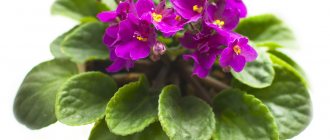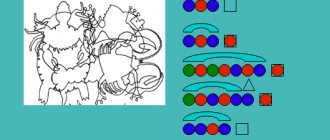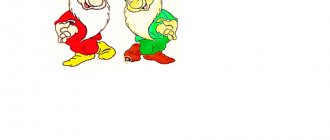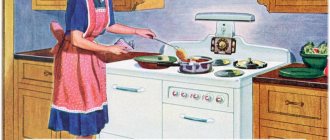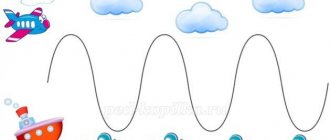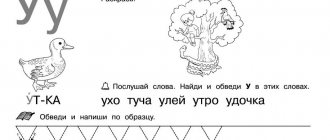Summary of the final speech therapy lesson in 1st grade on the lexical topic “Autumn”
Speech therapy lesson in elementary school.
Topic: “Farewell to autumn” Author: Meshcheryakova Svetlana Gennadievna, teacher - speech therapist MKOU Sh-I No. 8, Gremyachinsk, Perm region. Description: New ways of interaction between a teacher and a child are aimed at the socialization of children with speech impairments, at protecting and preserving health, regulating neuropsychic processes, stimulating brain function, promoting the inclusion of intact and activating impaired mental functions. The use of a single game plot, colorful demonstration material, and an accessible and attractive game situation make the cognitive process complete, while it is colored with positive emotions, so important for a child with SSD. All this keeps children interested in the topic and avoids overwork. The speech material is accessible in terms of pronunciation, simple in the sound composition of the word, which contributes to the children’s perception of it joyfully and with pleasure. The material may be useful to speech therapists, primary school teachers, parents, and educators. Goal: repetition and consolidation of previously acquired knowledge on the topic “Autumn”, improvement of students’ speech abilities. objectives : Clarify and expand the vocabulary on the topic “Autumn”. Improve the grammatical structure of speech. Learn to answer questions on the topic; write a descriptive story. Developmental: Develop gross, fine and articulatory motor skills. Improve auditory attention and imagination, the desire to speak out about what you hear, initiative, independence, and activity. Educational: Create conditions for the development of goodwill, the ability to interact with the teacher and with peers; expressions of various emotional states. Preliminary work: Examination of illustrations on the topic “Autumn”, composing phrases and sentences. Work on complex sentences in individual lessons. Learning physical exercises, poems on the theme “Autumn”, excursion to the autumn park, selection of illustrations.
Progress of the lesson:
1. Organizational moment.
Speech therapist: Hello, my dear children!
Glad to meet you! I am pleased to see you all beautiful! Let's look at each other, smile at each other and start the lesson. Our lesson will be festive and interesting. 2. Announcing the topic of the lesson.
Goal setting. Speech therapist: Could you guess the time of year from the sounds of nature? (Children's answers)
.
Listen to what time of year the sounds of nature will help us transport ourselves to. “The rustling of autumn leaves”, phonogram “Sounds of the surrounding world” (Children’s answers). The topic of the lesson is “Farewell to autumn.” Today we will talk about the wonderful and magical time of the year, autumn. What do you want to know?
(Children's answers)
*We will speak correctly and beautifully. *Let's repeat the signs of autumn, find out what only happens in autumn, write a story about autumn. We will talk about all this in class and make small discoveries.
3. Articulation gymnastics.
Speech therapist: In order for our speech to be expressive and correct, we will conduct articulatory gymnastics.
"The Tale of the Merry Tongue"
Once upon a time there lived a cheerful tongue in his house. Lips are the first doors to the house. Teeth are the second doors to the house. We perform the exercise: “Smile and a fence”
And there is a ceiling in this house, it’s called the sky. “Lift your tongue up, find the ceiling.”
We need language when we eat and talk. And the Little Voice helps us to make our words heard. He also lives in a house. This house is located in the throat. The little voice may or may not sleep. When the voice sleeps, it snores quietly, like this: “ssssss,” “sh-sh-sh-sh.” And when he wakes up, he sings songs. And he does it so loudly that everyone hears, like this: “z-z-z-z”, “z-z-z-z”! And the walls of Goloska’s house begin to tremble. We touch the neck with our palm.
Little tongue went for a walk in the autumn park. He admires Autumn’s beautiful outfit: “Oh-oh-oh, oh-oh-oh, oh-oh-oh!” (we repeat),
I saw an autumn mushroom under a tree and was surprised: “Oh-oh-oh, oh-oh-oh!”
A light autumn breeze blows: “U-oo-oo-oo-oo-oo.”
(Quietly.)
The leaves (fingers) barely move.
A strong wind blew “Oooooooooooooo!” (Loudly.)
Autumn leaves hang on the branches, autumn leaves say to us: “A-o-oo-ee.” The tongue returned home, and on the street at that time the autumn rain drummed on the roof of the house (d-d-d-d-d).
4.Development of fine and gross motor skills.
The north wind blew:
(Move your fingers and
“Ssssss”, blew all the leaves off the linden tree...
blow on them).
They flew, spun and fell to the ground.
The rain began to knock on them: “Drip-drip-drip, drip-drip-drip!” (Tap your fingers on the table)
The hail pounded on them, pierced the leaves through everything.
(Knock on the table with your fists).
The snow then dusted them,
(Smooth movements of the hands back and forth)
He covered them with a blanket.
(Press your palms firmly to the table) E. Karelskaya
5. Communication of new material.
Work according to plan.
Speech therapist: After summer comes (what?) (After summer comes autumn.)
Name the autumn months
(Autumn months are September, October, November)
What do you call autumn in September?
(Autumn in September is early, golden)
What can you call autumn in October?
(Autumn in October – rainy autumn)
What do you call autumn in November?
(Autumn in November - late autumn, the first snow often falls)
Poems about autumn. Child: The sky was already breathing autumn, the sun was shining less often, the day was getting shorter, the mysterious canopy of the forests was revealed with a sad noise. Fog was falling on the fields, and a caravan of noisy geese was stretching to the south. A rather boring time was approaching: November was already upon us. Speech therapist: What can you say about the sun in autumn? (The sun does not warm well in the fall, there are fewer sunny days).
What is the sky like in autumn?
(The sky in autumn is gloomy, heavy, cloudy, gray).
What happens to trees in autumn?
(The leaves on the trees turn yellow, turn red, dry out, and fall).
What is the name of the phenomenon in nature when leaves fall from trees?
(This autumn phenomenon is called leaf fall) Child: Leaf fall, leaf fall, yellow leaves are flying. Under the pressure of an evil wind, the garden will soon become bare.
Child: Yellow leaves are dancing, falling from the branches, flying. This golden fairy tale is called “leaf fall”.
Child: Falling leaves, falling leaves, Golden rain. Everything is flying, everything is flying Leaves, leaves, leaves! Different leaves, carved leaves, yellow, red - choose any. Along the path into the leaf fall We went out for a walk. And the guys had bouquets: “That’s what they are!” - left. Different leaves, Bright bouquets. We will remember this leaf fall for a long time! Speech therapist: Take a handkerchief - a piece of paper. Let's collect a bouquet in our palm. Exercise “Crumple a scarf” (gather the scarf into your palm, fingering it with your fingers, right and left hand) Speech therapist: Now let’s arrange colorful leaf fall. What music will the leaves spin to? (Children's answers) Dance - improvisation, R. Pauls "Waltz" Speech therapist: Let's decorate our autumn with bright colors. (Children blow on handkerchiefs and they “fly” to the autumn meadow). Speech therapist: Look, the leaves in our clearing come from different trees: some are maple, some are oak. And these leaves, from what trees?
(speech therapist shows birch and aspen leaves)
Shall we play with them?
6. Physical exercise
Children perform movements with leaves, improvising to the music “Oak leaves...”.
So, we made our first small discovery: leaf fall occurs in the fall.
7. Creative task.
The technique used is: “Writing a syncwine”
8. Enrichment of vocabulary.
Speech therapist: Let’s continue our conversation, what do birds do in the fall? (In autumn, birds fly to warmer climes)
What are these birds called?
(These are migratory birds).
What do insects do in the fall?
(Insects hide in the fall)
What do animals do in the fall?
(Animals prepare for winter, hibernate, change their coats, make supplies). We made a second discovery in the fall: migratory birds fly to warmer regions, many animals and insects prepare for hibernation. Speech therapist: What kind of work do people do in the fall? (In gardens and vegetable gardens, the entire harvest is ripening, the harvest is being harvested, and winter preparations are being made from vegetables and fruits).
Another
discovery: In autumn there is a final harvest.
Game “Find out by taste” (children are invited to try fruits and vegetables with their eyes closed, they need to guess and name them).
9. We compose the story according to plan.
10. Lesson summary
1. Today we remembered all the signs of autumn.
We found answers to all the questions and made small discoveries : “Autumn is the time of year. Autumn is different. Have you found out what only happens in autumn? (harvest, birds flying away, leaf fall)
.”
2. Assessing children’s work for the lesson. 3. Assessment of children's activities.
You enjoyed the activity and are in a good mood! I'm in a great mood too! I wish you big and small discoveries at this wonderful time of year!
We recommend watching:
Autumn holiday in 1st grade. Script Quiz with answers on the topic Autumn for primary school Autumn ball in primary school. Script Quiz on the topic: Autumn with answers for grades 1-2
Similar articles:
Autumn holiday in elementary school. Mushrooms
Autumn Festival for high school students. Script and competitions
Autumn Festival in elementary school. Script, 1st grade
Class hour “Late Autumn”, 2nd grade
Autumn Festival in elementary school. Scenario with competitions
Synopsis of a frontal correctional and developmental lesson on the topic “Autumn”
The outline of a frontal correctional and developmental speech therapy lesson is aimed at activating the vocabulary on the topic “Autumn” in preschool children with OPD.
Correctional educational task:
- systematize children’s knowledge about autumn and autumn phenomena;
- activate the verb dictionary on this topic;
- continue to learn how to make sentences based on pictures, and from them a short story;
- continue to teach children to answer questions in complete sentences;
- continue to learn to coordinate movements with speech.
Corrective and developmental task:
- develop fine motor skills of the fingers through finger exercises;
- continue to develop memory and thinking through games and exercises.
Corrective educational task:
- cultivate a positive attitude towards the lesson, independence, control over one’s own speech.
Equipment: presentation, autumn leaves, music “Sounds of the autumn forest”, ball.
Preliminary work: reading poems about autumn by F. I. Tyutchev, A. K. Tolstoy, P. M. Pleshcheev, A. S. Pushkin. Learning poems about the autumn months.
Progress of the lesson
1. Organizational moment
Speech therapist: Guys, say hello to our guests. Today we have an unusual activity, we will travel with you! Guess what time of year we'll go?
I bring in the harvests, I sow the fields again, I send the birds south, I strip the trees, But I don’t touch the pines and fir trees. I... (autumn)
Speech therapist: That's right, we're going to Autumn.
The music of the autumn forest sounds.
2. Game “Autumn Piggy Bank”.
Speech therapist:
— What autumn months do you know? (September October November).
- Tell poems about autumn (Children recite poems about the autumn months).
The collective farm garden is empty, Cobwebs are flying into the distance, And cranes have flocked to the southern edge of the earth. The doors of the schools opened... What month has it come to us?
The face of nature is becoming increasingly gloomy, the vegetable gardens have turned black, the forests are becoming bare, the bird voices have fallen silent. The bear fell into hibernation... What month did it come to us?
The field became black and white. It's raining, then snow, and it's also getting colder, and the waters of the rivers are frozen in ice. The winter rye is freezing in the field... What month is it, tell me?
Speech therapist:
— Guys, what autumn signs do you know?
- The sky is covered with clouds. The sun peeks out from behind the clouds less and less.
- An angry north wind is blowing.
- It often rains coldly.
- The leaves on the trees turn yellow, red, and fall off.
- Leaves cover the ground with a colorful carpet.
- Birds fly away to warmer regions.
- People are harvesting.
- Mushrooms and berries appeared in the forest.
3. Game “Pick up the action”.
Speech therapist:
— Guys, you said that the wind often blows in autumn. Today it has been blowing since the very morning, I met him on the way to kindergarten, and he gave me a magic ball.
The autumn and magical ball will jump into your hands and ask questions.
Speech therapist:
- Guys, let's go to the autumn meadow and play a game. To whom I throw the ball, he answers the question, and for the correct answer I will give you an autumn leaf.
Leaves in autumn (what do they do?) - Leaves turn yellow in autumn, fall off, etc. Rain in autumn - Rain in autumn drizzles, falls, etc. Harvest in autumn - Harvest is harvested in autumn. Birds in autumn - Birds fly away in autumn. Trees in autumn - Trees shed leaves in autumn. Animals in the fall - Animals in the fall prepare for winter, change their coats.
4. Breathing exercises
Speech therapist:
- Take the leaf that you like best and gently blow on it. Now let’s blow on the leaves with force.
We perform breathing exercises.
This is the kind of leaf fall we have.
5. Game “Autumn Leaves”.
Children with pieces of paper in their hands stand in a circle and recite a poem together with the teacher.
Leaf fall, leaf fall, (leaves in hand, waves alternately with both hands) Yellow leaves are flying, rustling underfoot (crouching, throwing leaves on the floor) And flying, flying, flying...
6. Finger game “Autumn Bouquet”.
Speech therapist:
- Guys, let's collect an autumn bouquet.
Children say in chorus: One, two, three, four, five - Let's collect leaves. (Clench and unclench your fists). Birch leaves. Rowan leaves, poplar leaves, aspen leaves, oak leaves (bend your fingers one by one). We will collect an autumn bouquet in a vase. (Clench and unclench your fists).
7. Retelling the story using pictures.
Speech therapist:
- Listen to the story and try to retell it using the pictures.
"Autumn"
Autumn has come. The sun is weakly warm. Strong wind blows. Gray clouds are floating across the sky. It often rains coldly. The wind tears yellow leaves from the trees. Leaves cover the ground with a colorful carpet. Birds fly south.
Retelling the story.
8. A moment of relaxation.
Speech therapist:
- Now let's rest. Lie down on a yellow autumn meadow, close your eyes, relax.
The children are lying “in the clearing”, the speech therapist is reading a poem.
“In Autumn” (A. Pleshcheeva)
Autumn has arrived. The flowers have dried up, And the bare bushes look sad. The grass in the meadows withers and turns yellow, Only the winter in the fields turns green. A cloud covers the sky, the sun does not shine; The wind howls in the field; The rain is drizzling. The waters of the fast stream began to rustle, the birds flew away to warmer lands.
Calm music sounds.
9. Summary of the lesson.
Speech therapist:
— The lesson has come to an end, tell me, what time of year did we talk about during the lesson? What happens only in autumn?
| Transition Valentina Vladimirovna, teacher-speech therapist, MBDOU Volokonovsky combined kindergarten No. 1 “Berezka” Volokonovsky district, Belgorod region |
- Speech therapist assignments on the topic [Autumn]
- Summary of a lesson on the development of coherent speech, topic [Autumn], senior preschool age
- Homework on the lexical topic “Autumn” for children in the senior speech therapy group
- Summary of individual correctional and developmental lesson: Sound production [Ш]
- Information for parents of the preparatory group on the lexical topic “Golden Autumn”
( 4 liked, average score: 5.00 out of 5)
Loading...
